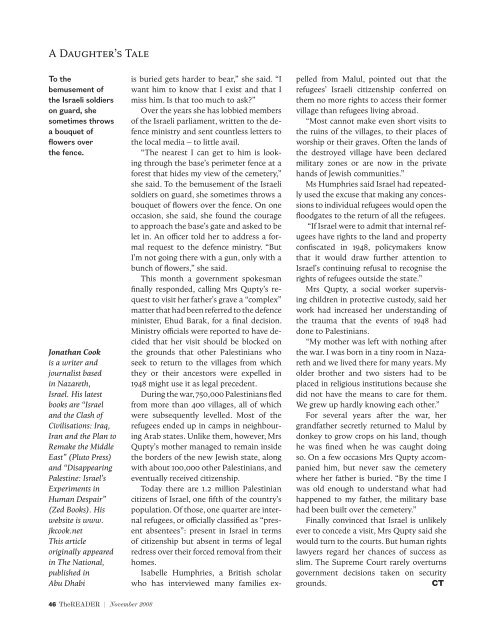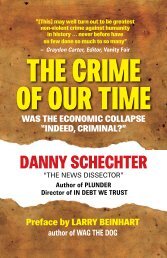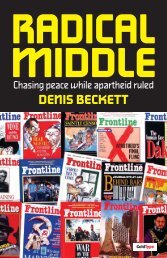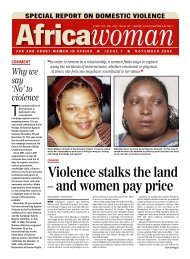Chris hedges AND george Monbiot ON THE IGNORANcE - ColdType
Chris hedges AND george Monbiot ON THE IGNORANcE - ColdType
Chris hedges AND george Monbiot ON THE IGNORANcE - ColdType
Create successful ePaper yourself
Turn your PDF publications into a flip-book with our unique Google optimized e-Paper software.
A Daughter’s Tale<br />
to the<br />
bemusement of<br />
the israeli soldiers<br />
on guard, she<br />
sometimes throws<br />
a bouquet of<br />
flowers over<br />
the fence.<br />
Jonathan Cook<br />
is a writer and<br />
journalist based<br />
in Nazareth,<br />
Israel. His latest<br />
books are “Israel<br />
and the Clash of<br />
Civilisations: Iraq,<br />
Iran and the Plan to<br />
Remake the Middle<br />
East” (Pluto Press)<br />
and “Disappearing<br />
Palestine: Israel’s<br />
Experiments in<br />
Human Despair”<br />
(Zed Books). His<br />
website is www.<br />
jkcook.net<br />
This article<br />
originally appeared<br />
in The National,<br />
published in<br />
Abu Dhabi<br />
46 thereader | November 2008<br />
is buried gets harder to bear,” she said. “I<br />
want him to know that I exist and that I<br />
miss him. Is that too much to ask?”<br />
Over the years she has lobbied members<br />
of the Israeli parliament, written to the defence<br />
ministry and sent countless letters to<br />
the local media – to little avail.<br />
“The nearest I can get to him is looking<br />
through the base’s perimeter fence at a<br />
forest that hides my view of the cemetery,”<br />
she said. To the bemusement of the Israeli<br />
soldiers on guard, she sometimes throws a<br />
bouquet of flowers over the fence. On one<br />
occasion, she said, she found the courage<br />
to approach the base’s gate and asked to be<br />
let in. An officer told her to address a formal<br />
request to the defence ministry. “But<br />
I’m not going there with a gun, only with a<br />
bunch of flowers,” she said.<br />
This month a government spokesman<br />
finally responded, calling Mrs Qupty’s request<br />
to visit her father’s grave a “complex”<br />
matter that had been referred to the defence<br />
minister, Ehud Barak, for a final decision.<br />
Ministry officials were reported to have decided<br />
that her visit should be blocked on<br />
the grounds that other Palestinians who<br />
seek to return to the villages from which<br />
they or their ancestors were expelled in<br />
1948 might use it as legal precedent.<br />
During the war, 750,000 Palestinians fled<br />
from more than 400 villages, all of which<br />
were subsequently levelled. Most of the<br />
refugees ended up in camps in neighbouring<br />
Arab states. Unlike them, however, Mrs<br />
Qupty’s mother managed to remain inside<br />
the borders of the new Jewish state, along<br />
with about 100,000 other Palestinians, and<br />
eventually received citizenship.<br />
Today there are 1.2 million Palestinian<br />
citizens of Israel, one fifth of the country’s<br />
population. Of those, one quarter are internal<br />
refugees, or officially classified as “present<br />
absentees”: present in Israel in terms<br />
of citizenship but absent in terms of legal<br />
redress over their forced removal from their<br />
homes.<br />
Isabelle Humphries, a British scholar<br />
who has interviewed many families ex-<br />
pelled from Malul, pointed out that the<br />
refugees’ Israeli citizenship conferred on<br />
them no more rights to access their former<br />
village than refugees living abroad.<br />
“Most cannot make even short visits to<br />
the ruins of the villages, to their places of<br />
worship or their graves. Often the lands of<br />
the destroyed village have been declared<br />
military zones or are now in the private<br />
hands of Jewish communities.”<br />
Ms Humphries said Israel had repeatedly<br />
used the excuse that making any concessions<br />
to individual refugees would open the<br />
floodgates to the return of all the refugees.<br />
“If Israel were to admit that internal refugees<br />
have rights to the land and property<br />
confiscated in 1948, policymakers know<br />
that it would draw further attention to<br />
Israel’s continuing refusal to recognise the<br />
rights of refugees outside the state.”<br />
Mrs Qupty, a social worker supervising<br />
children in protective custody, said her<br />
work had increased her understanding of<br />
the trauma that the events of 1948 had<br />
done to Palestinians.<br />
“My mother was left with nothing after<br />
the war. I was born in a tiny room in Nazareth<br />
and we lived there for many years. My<br />
older brother and two sisters had to be<br />
placed in religious institutions because she<br />
did not have the means to care for them.<br />
We grew up hardly knowing each other.”<br />
For several years after the war, her<br />
grandfather secretly returned to Malul by<br />
donkey to grow crops on his land, though<br />
he was fined when he was caught doing<br />
so. On a few occasions Mrs Qupty accompanied<br />
him, but never saw the cemetery<br />
where her father is buried. “By the time I<br />
was old enough to understand what had<br />
happened to my father, the military base<br />
had been built over the cemetery.”<br />
Finally convinced that Israel is unlikely<br />
ever to concede a visit, Mrs Qupty said she<br />
would turn to the courts. But human rights<br />
lawyers regard her chances of success as<br />
slim. The Supreme Court rarely overturns<br />
government decisions taken on security<br />
grounds. CT
















